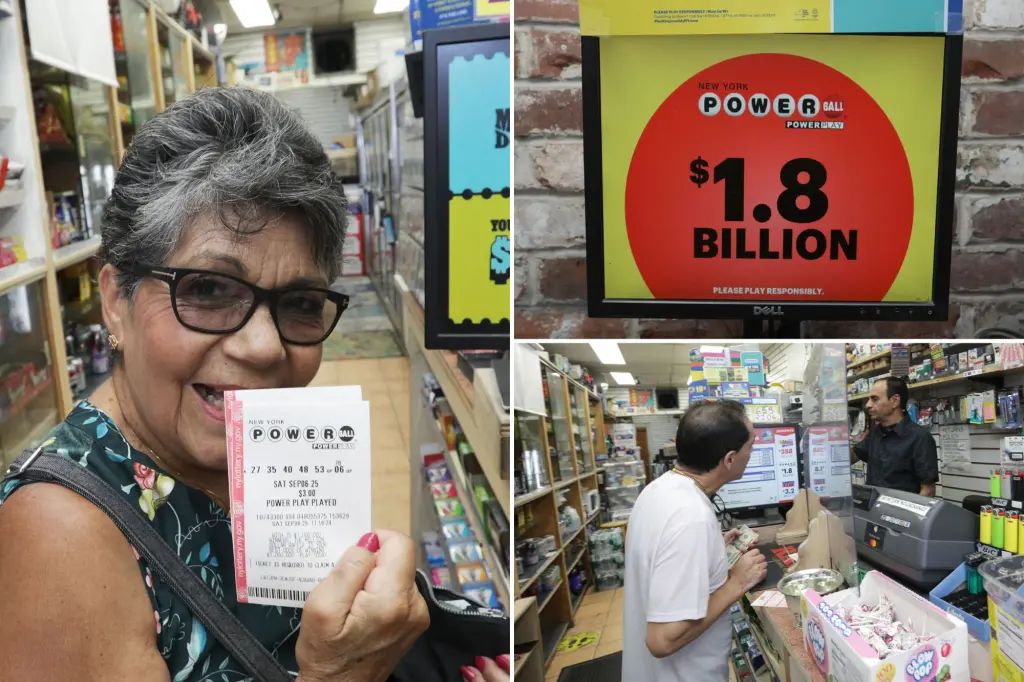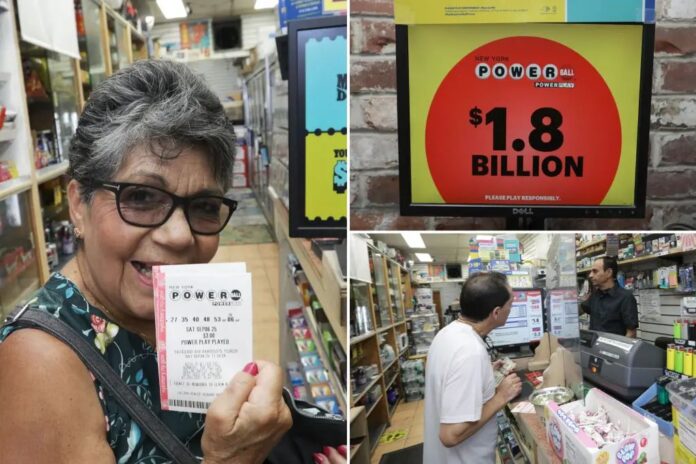🎉 BILLION-DOLLAR DREAMS COME TRUE! 💰
Two Lucky Souls Just Split a $1.79B Powerball Jackpot! 🤑 Picture this: a three-month wait, hearts pounding, and then—BAM!—two tickets hit the jackpot of a lifetime, shattering records and changing lives forever. Who are these mystery winners from Missouri and Texas? Are they friends sharing a ticket, a family planning their dream future, or strangers with a wild stroke of luck? 😲 The numbers were drawn, the drought is over, and the story is just beginning. Want to know what’s next for these new billionaires? Click to dive into the craziest lottery win of 2025! 👇

On the night of September 6, 2025, the air was electric with anticipation. Across the United States, millions clutched their Powerball tickets, hoping to end a three-month drought that had seen the jackpot balloon to an eye-popping $1.787 billion—the second-largest in U.S. lottery history. When the numbers 11, 23, 44, 61, 62, and Powerball 17 flashed across screens, two lucky tickets—one from Missouri, one from Texas—emerged as the winners, splitting a prize that could redefine their lives and captivate the nation’s imagination. This wasn’t just a lottery win; it was a moment that reminded us all of the wild, improbable allure of chasing a dream. But who are these winners, what does this windfall mean, and what can we learn from a jackpot that nearly touched $2 billion?
A Drought Ends in Triumph
For three months, Powerball players had watched the jackpot grow, drawing after drawing, with no grand prize winner. Since the last jackpot was claimed on May 31, 2025, in California for $204.5 million, 42 consecutive drawings had passed—an all-time record tie for the game’s longest streak without a winner. Starting at a modest $20 million on June 2, the jackpot surged as ticket sales skyrocketed, fueled by the promise of a life-altering payout. By August 29, it had crossed the $1 billion mark, and by the September 6 drawing, it reached $1.787 billion, with a cash value of $826.4 million before taxes.
The winning tickets were sold in Missouri and Texas, states where lottery fever runs high and winners can choose anonymity, shielding their identities from the public eye. Each ticket is worth approximately $893.5 million if taken as an annuity over 30 years with 5% annual increases, or $410.3 million as a lump sum after federal taxes (and no state taxes, as both states exempt lottery winnings). The odds of winning were a staggering 1 in 292.2 million, yet two players defied those odds, turning a $2 ticket into a fortune.
Queens resident Rosa Leon holds up her Powerball tickets at the Avadh Convenience Store in Astoria, Queens on Sept. 6, 2025.
The Mystery of the Winners
Who are the people behind these tickets? That’s the question on everyone’s mind. In Missouri and Texas, lottery winners can remain anonymous, a choice many opt for to avoid the media frenzy and unsolicited attention that often follow such windfalls. Are these winners lone players who picked their numbers on a whim? A group of coworkers who pooled their money? Or perhaps a family who’ve played the same numbers for years? The possibilities are endless, and the secrecy only adds to the intrigue.
Past Powerball winners offer a glimpse of what might be unfolding. Take Edwin Castro, who won a record $2.04 billion in California in November 2022. He chose the lump sum of $997.6 million and kept a low profile, with little known about his plans beyond buying a mansion and luxury cars. Or consider Cheng “Charlie” Saephan, who won $1.326 billion in Oregon in April 2024 and split the prize with his wife and a friend, planning to buy a home and seek better medical care for his cancer treatment. Each winner’s story is unique, shaped by their circumstances, dreams, and challenges.
For the Missouri and Texas winners, the decision to take the lump sum or annuity looms large. The lump sum offers immediate access to $410.3 million per ticket (before additional federal taxes of up to 37%), ideal for those eager to invest or spend now. The annuity, with its 30-year payout, provides long-term security and helps manage the overwhelming wealth. Financial advisors often recommend the annuity to avoid the pitfalls of sudden riches—stories of lottery winners going bankrupt are all too common—but the allure of instant millions is hard to resist.
The Powerball Phenomenon
The $1.787 billion jackpot didn’t just happen overnight. It’s the result of a carefully engineered system designed to create massive prizes. Powerball, launched in 1992, operates in 45 states, Washington, D.C., Puerto Rico, and the U.S. Virgin Islands. For $2, players pick five numbers from 1 to 69 and one Powerball from 1 to 26. Matching all six wins the jackpot, while smaller prizes start at $4. The game’s odds were adjusted in 2015 to make jackpots harder to win, increasing the pool of white balls and reducing the chances from 1 in 175.2 million to 1 in 292.2 million. This change, coupled with higher ticket prices and nationwide sales, has led to jackpots regularly topping $1 billion.
Since 2016, Powerball and its rival, Mega Millions, have produced over a dozen billion-dollar jackpots. The largest was the $2.04 billion won in 2022, followed by a $1.765 billion prize in California in 2023. The $1.787 billion win ranks second, surpassing the $1.586 billion split by three winners in 2016. These mega-jackpots drive ticket sales, with over 111 million tickets sold for a single drawing in August 2025 when the prize hit $1.1 billion. The frenzy isn’t just about money; it’s about the dream of transcending everyday struggles, whether it’s paying off debt, buying a home, or retiring early.
The Aftermath of a Windfall
Winning a billion-dollar jackpot sounds like a fairy tale, but it comes with challenges. The IRS takes 24% upfront and up to 37% total, reducing a $410.3 million lump sum to roughly $258.5 million after federal taxes. In Missouri and Texas, no state taxes apply, a rare advantage compared to states like New York, where taxes can exceed 10%. Beyond taxes, winners face pressure from family, friends, and scammers. Stories abound of winners besieged by requests for money or targeted by fraud. Anonymity, where allowed, helps, but it’s not a complete shield.
Financial advisors urge winners to assemble a team—lawyers, accountants, and planners—before claiming the prize. Many recommend low-risk investments, charitable giving, or setting up trusts to manage wealth. Yet, the human side of winning can be overwhelming. A New Jersey man who won $273 million in 2019, days after finalizing a divorce, faced a media storm and personal upheaval. Others, like the anonymous South Carolina winner of $1.537 billion in 2018, used their wealth to quietly transform their lives, donating to causes or securing their family’s future.
The Missouri and Texas winners are at the start of this journey. Will they splurge on luxury, invest in businesses, or give back to their communities? Powerball’s proceeds already fund public programs—over $36 billion since 1992 for education, infrastructure, and more—so their win indirectly supports the greater good. But their personal choices will shape their legacy.
A Cultural Moment
The $1.787 billion win isn’t just a financial event; it’s a cultural phenomenon. Social media buzzed with reactions, from celebratory emojis to debates about what people would do with such wealth. Posts on X captured the excitement, with users joking about “generational fumbles” or marveling at the odds. The jackpot tapped into a universal longing for a better life, especially in a world of economic uncertainty. For every ticket sold, there’s a story—a single mom hoping to pay for her kids’ college, a retiree dreaming of travel, or a worker wanting to escape the daily grind.
The win also highlights America’s complex relationship with lotteries. Critics argue they disproportionately attract lower-income players, who spend a higher share of their income on tickets despite slim odds. Yet, the allure of a billion-dollar prize transcends class, drawing in everyone from casual players to syndicates. As one X user put it, “You have a 1 in 292 million chance, but if you win, you’re set for life.” That hope, however improbable, keeps the dream alive.
Looking Ahead
As the Missouri and Texas winners prepare to claim their prizes, the nation watches with bated breath. Will they step forward publicly, like the Tennessee family who won part of a $1.586 billion jackpot in 2016, or stay in the shadows? Will they choose the lump sum or annuity? And how will their lives change? The Powerball jackpot will reset to $20 million for the next drawing, but the memory of this historic win will linger.
For now, the story is one of triumph and possibility. Two tickets, two states, and one massive prize have reminded us that luck can strike when least expected. If you played Powerball on September 6, check your ticket—you might be holding a smaller prize, as over 6.3 million tickets won something that night. And if you’re dreaming of the next big win, keep an eye on Powerball.com for the latest drawings, every Monday, Wednesday, and Saturday at 10:59 p.m. ET. The odds may be long, but as this jackpot proves, miracles do happen.



